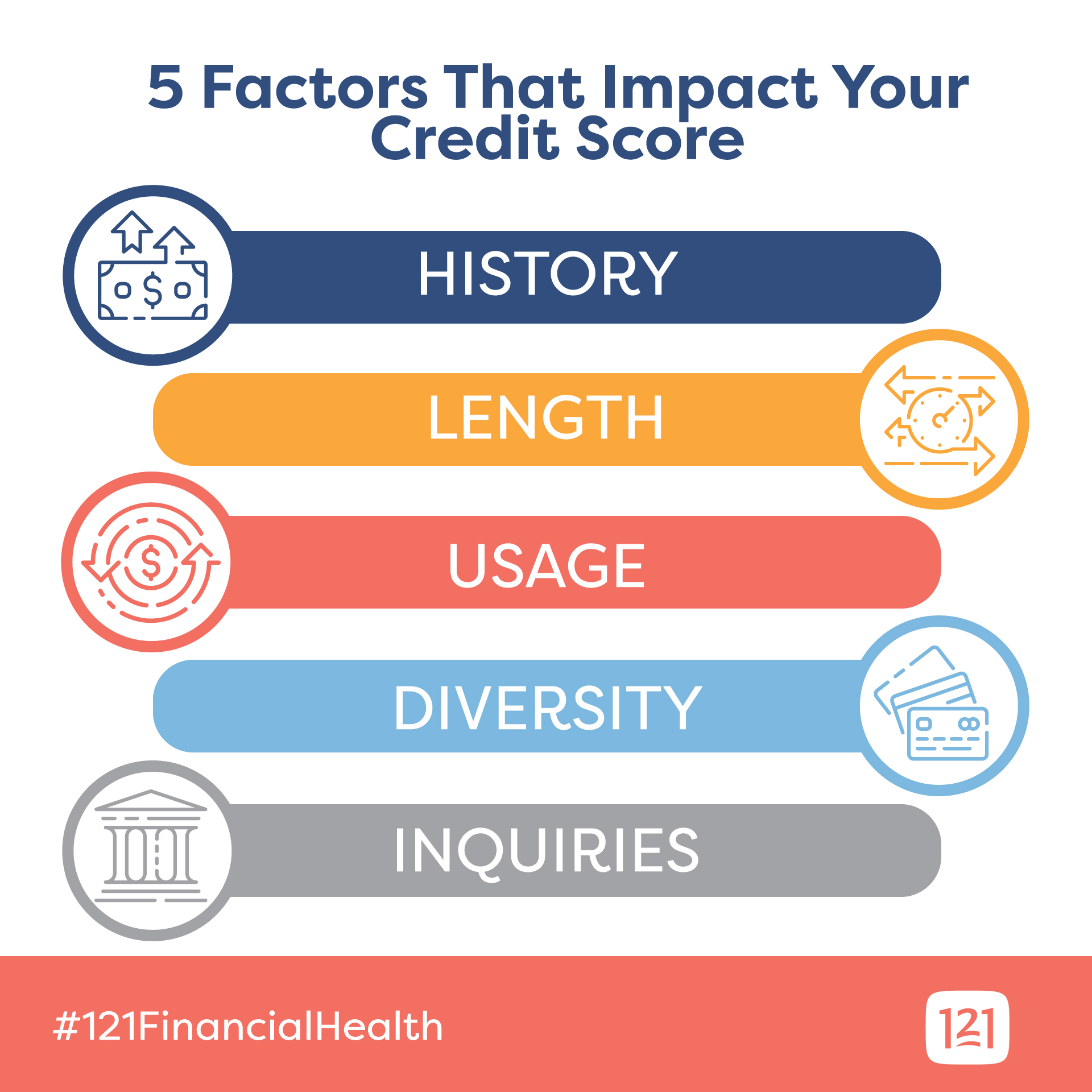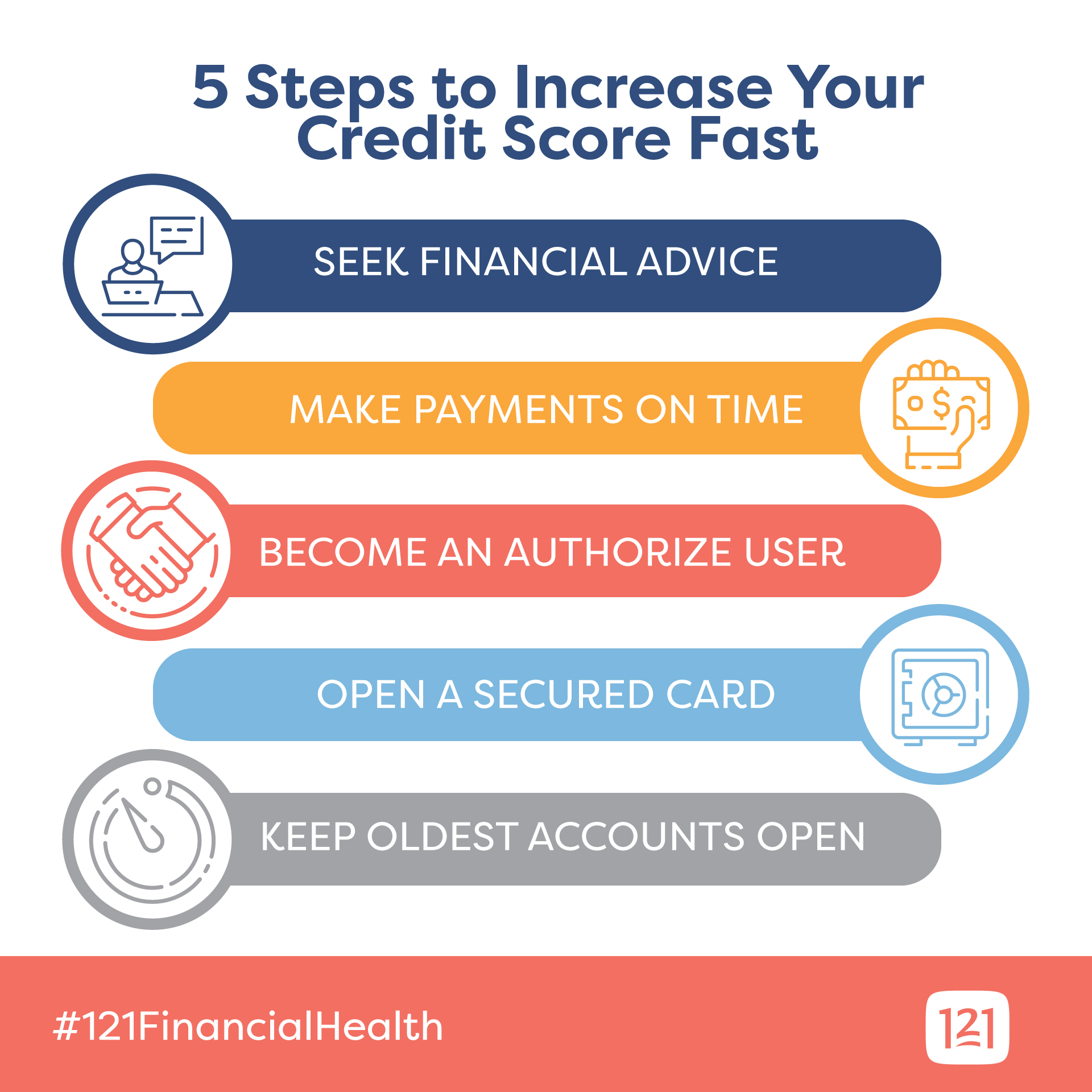
How to Build Credit Fast: 5 Steps to Increase Your Score
Your credit can help pave the way for you to achieve your dreams or it can stand in the way of you reaching those goals. Whether your credit is an asset or a liability to your future depends, of course, on how good it is, and the most widespread and prevalent measure virtually all lenders and creditors use of your credit is your credit score.
A high credit score grants you access to bigger loans at lower interest rates with lower monthly payments and less up-front costs. A low credit score, by contrast, closes the doors to many loans altogether, while those remaining available are smaller in amount yet higher in cost.
With a high credit score, you can more easily buy a home, or a be approved for a car loan, or fund a new small business. With a low credit score, you may have to pay extra deposits and fees just to uplift yourself and care for your family.
In this blog, you will learn how to build your credit quickly and how to increase your credit score fast-- including the easy steps you can take starting today to build better credit and raise that credit score as fast as you can.

What is A Credit Score?
Before you can learn how to increase your credit score, it helps to know what a credit score is and how it is calculated. Basically, a credit score is a number used to indicate your creditworthiness.
Regardless of the scoring model utilized (more on this below,) the metric credit scores aim to provide to creditors and lenders is the odds a consumer will fall 90 days or more behind on a debt within the next two-year period. Lenders and creditors, then, use this number to gauge the probability that you will repay a debt in a timely manner.
There are two main types of credit scoring utilized by most creditors and lenders:
FICO
An acronym of the name Fair, Isaac and Company, the FICO score is the original and, arguably, most widespread and commonly used credit scoring system. FICO scores generally range between 300 and 850, as follows:
- 800 to 850 - Exceptional
- 740 to 799 - Very Good
- 670 to 739 - Good
- 580 to 669 - Fair
- 300 to 579 - Very Poor
VantageScore
An alternative to the FICO scoring system, the VantageScore was developed by a cooperative effort of the three main credit reporting bureaus: Equifax, Experian and TransUnion. The most current incarnation of VantageScores range between 300 and 850, like FICO scores, though with slightly different valuations, as follows:
- 750 to 850 - Excellent
- 700 to 749 - Good
- 650 to 699 - Fair
- 550 to 649 - Poor
- 300 to 549 - Very Poor
Certain differences exist between the two scoring models. For one, you can’t even get a FICO score until you have at least one credit account open for at least six months as well as activity on an open credit account within the last six months. By contrast, you can get a VantageScore provided you have at least one account on at least one credit report, no matter how new or old, no matter how recently active.
One of the biggest differences between FICO and VantageScore scores are that your FICO score could be slightly different for each of the three bureaus, as FICO adjusts its scoring metrics to accommodate differences in each bureau’s database.
Your VantageScore, by contrast, is the same across all three credit bureaus. Therefore, obtaining your FICO score from at least one of the bureaus and your VantageScore can give you a reasonably broad view of how lenders and creditors might view your creditworthiness depending on which bureau or scoring system they utilize.
Factors That Determine a Credit Score
Only certain factors affect your credit score. Learning what these factors are and how they affect your credit score can help you more effectively target the areas where you can produce the greatest results with the least effort.

While the different credit scoring systems rank and value each of these factors slightly differently, the factors they utilize to calculate your credit score are all based on your credit history, as follows:
- Payment History - Have you made payments on time or late? If you’ve made late payments, how late and how often? Do you have any accounts in collection? Have you defaulted on any debts or ever declared bankruptcy? This shows your level of consistency in remaining responsible for your debts.
- Length of Credit - How long has it been since you’ve opened your oldest line of credit? This shows your degree of experience managing credit accounts.
- Credit Usage - How much of your available credit are you currently using? This is expressed in multiple ways, including both as your total balances owed and as a percentage of your available credit known as your credit utilization rate. The more you owe versus your income and the more of your available credit you are using at any given point, the less able you appear to take on new debt.
- Account Diversity - Are all your credit accounts credit cards, or do you have other types of debt as well, such as car loans or home mortgages? Showing a wider variety of credit account types rather than all credit cards shows you have more experience effectively managing multiple kinds of debt at once.
- Recent Credit Inquiries - Have any other lenders or creditors looked up your credit recently, and if so, how many? How recently did you open new credit accounts? Lenders and creditors want to make sure you’re not trying to take on too much debt at once, so they know you’ll be responsible to them for the credit they provide you.
Why Would My Credit Score Be Different Across the Three Bureaus?
While your VantageScore should be the same regardless of bureau, your FICO score may be different depending on the bureau you use to retrieve it. The reason is simple: not all creditors and lenders report uniformly or on the same time-frame to each of the three credit bureaus. Certain bureaus may, therefore, be missing certain information or contain information other bureaus are lacking
This is why it’s essential you make sure all three credit bureaus contain all accurate and updated information about your credit history. By checking your credit reports annually and tracking them throughout the year, you can make sure that a change reflected on one report is reflected on all reports, and any inaccurate changes are corrected immediately.
How to Track my Credit Score
You can track your credit score by using a credit score monitoring service provided by one of the credit bureaus, FICO or VantageScore themselves or a responsible third-party agency.
How Long Does it Take to Build A Credit Score
As previously indicated, you can have a VantageScore credit score the moment one of the three credit bureaus becomes aware that you have your first open line of credit and, consequently, creates a credit report for you.
To help spur this along, you can always contact each of the three bureaus the moment you open your first credit account to inform them. Your first FICO score will become available just six months after.
5 Steps to Build Your Credit Quickly and Increase Your Credit Score
Each of the following steps can work alone to help you build credit fast and boost that credit score. Combine more than one together and you boost your efforts all the more. Act on any of these steps first as you see fit, and work through them in any order you wish.
One recommendation is to start with the step that seems easiest, so you can complete it and see results the quickest. That small success can, then, spur you to complete more involved or personally challenging steps for even greater rewards.
Step 1 - Seek Help from a Financial Advisor
There’s nothing like the one-on-one personal guidance of a qualified financial expert to help you navigate the minefield of credit and debt. An expert advisor can help you create a realistic game plan to build your credit and boost your credit score the quickest and most effectively you can. 121FCU offers free financial counseling for all of our members.
Step 2 - Pay All Your Bills on Time Every Month
The quickest way to build great credit and keep it great is to pay all your bills on time each and every month. If you can pay more than the minimum balances due, even better.
If you can’t pay more than the minimum balances due on all of them, pay more toward the one or ones with the highest interest first. Then, work toward lowering the one or ones with the highest balances. This insures that your're making the most impact on lowering your overall debt each month, strategically.
Step 3 - Become an Authorized User on Another Person’s Credit Card
When you become an authorized user on someone else’s credit card, the credit bureaus start tracking that credit account on your credit reports just as if you had opened that account yourself. You can therefore show a longer and more responsible history of using credit than you otherwise could.
Just make sure you choose someone you trust to have excellent credit, or at least an impeccable credit history with the account to which they’re adding you.
Step 4 - Get a Secured Credit Card
Like becoming an authorized user on another person’s credit card, getting a secured credit card is another way to break through that paradox of not being able to get credit without first having credit. When you apply for a secured credit card, you can be guaranteed approval for a credit line equal to the amount of money you deposit into a secure account to cover your balances in case you default on your debt.
The lender or creditor may still look up you credit score when you apply, but only to help determine the appropriate interest rate and monthly payment to charge you. As you utilize your secured card and continue paying your balances on time, you will build a credit history and increase your credit score.
Step 5 - Keep your Oldest Credit Accounts Open.
Even if you’ve stopped using a particular credit card, if it’s your oldest card, don’t close it out. The reason is simple: it will shorten the length of your credit history, which is one of the main factors used by both FICO and VantageScore to determine your credit score. Length of credit history can make a huge impact on your score.

Do's and Don't While Trying to Build Credit
As you strive to build your credit fast, there are certain ways you can help or hinder your progress along the way.
DO: Get Your Free Credit Report Every 12 Months
Every American has the right by law to request one free copy per year of his or her credit report from each of the three main credit reporting bureaus: Equifax, Experian and TransUnion. To request your free annual credit report from any or all three of the credit reporting bureaus, go to AnnualCreditReport.com.
Beware of any site that tries to charge you to get your free annual credit report. A company can legitimately charge you for additional services, such as to access your credit scores or activate credit-monitoring services, but getting your one annual credit report from each of the bureaus should be completely free.
DO: Check your credit reports for inaccuracies.
Some of the items affecting your credit score may not even be related to actions you did or didn't take. Some items may simply be inaccurate, whether because a creditor or lender reported it wrong or simply failed to report a payment properly or in a timely fashion.
If, upon examining any of these reports, you find any inaccuracies, contact the provider of that credit report (Experian, Equifax or TransUnion) immediately to dispute the item and request an investigation and corrective action. Then, if you haven’t already, check to make sure your credit reports from the other two bureaus do not contain the same inaccuracy. If so, contact each of those bureaus as well to get it corrected.
You may need to provide documentation proving that the item is not accurate, such as a receipt showing that you paid a bill in full that is listed as still outstanding. Once your credit report is corrected, it can take a month or longer for the correction to be reflected in your credit score. You can help expedite this process, however, by notifying the credit scoring agency, FICO or VantageScore, of the correction.
DON'T: Have too many hard inquiries in a short time span.
Like we said above, multiple applications in a short time span could possibly be viewed as you being a riskier borrower than someone who applies less often. Every credit inquiry lowers your score by just a few points. Whether your application is approved or rejected makes no difference in your score. That’s why it makes sense to be almost certain you'll be approved before you apply. You don’t want to lose those hard-earned points and still not have the credit you needed.
DO: Wait around 6 months between larger lines of credit like home or auto loans.
Losing points due to a credit inquiry is on a sliding scale. What this means is that someone with a higher score is like to lose less points than someone with a lower score. However, any lost points due to inquiries are usually regained after 6 months. Be strategic when it comes to making a large credit decision. For example, you may not want to apply for 3 new credit cards if you know you are going to apply for a home loan in 3 months.
Summary
By taking a point system approach learning about credit scores, you can create a custom strategy to stick to and set achievable goals and deadlines. With a clearer understanding of what a credit score is, how to build your credit quickly, and how to increase your credit score, you can start to put these tactics into action. Contact 121FCU for all the help you need with your next steps toward financial freedom.
